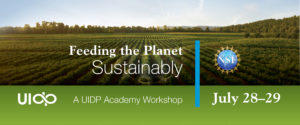Biotechnology workshops aim to identify new directions for transformative research
A key lesson learned from the response to the COVID-19 pandemic is the critical role that basic and use-inspired research play in solving society’s most pressing challenges. A new workshop series led by UIDP on behalf of the National Science Foundation is designed to leverage the country’s top scientific minds to identify biotechnology areas where strategic investments will accelerate the transformation of research into products, services and new techniques that serve as the cornerstone for Industries of Tomorrow.
In five workshops over five months, UIDP, a non-profit membership organization comprising leading innovation companies and research-intensive universities, will convene interdisciplinary groups of scientists to examine specific biotechnology areas where increased research activity could yield results that translate into real-world solutions. The invitation-only workshops will leverage the leading scientific minds from academia, industry, and government, who will work together to identify research areas ripe for partnership and collaboration.
“We know that the world’s greatest challenges can be addressed with effective, cross-sector collaboration. Governments around the world are ready to invest, sometimes in partnership with industry and nonprofits, in research that can rapidly result in discovery and solutions at scale,” said Anthony Boccanfuso, UIDP’s president and CEO.
Beginning with a two-day virtual workshop in July, the five events in the series aim to develop key research themes for five major societal challenges:
- Feeding the Planet Sustainably (July 28-29);
- World without Waste: A Circular Bioeconomy (Aug. 19-20);
- Biological Mitigation of Climate Change (October);
- Economic and Societal Challenges and Opportunities of Biotechnology (TBD); and
- One Health (TBD).
“Biotechnology is one of NSF’s five Industries of Tomorrow and a priority area for all of the directorates across the agency,” said Theresa Good, division director for the Division of Molecular and Cellular Biosciences at NSF and chair of the agency’s Bioeconomy Coordinating Committee. “In the past, our investments in fundamental and translational research, infrastructure, and the workforce have advanced the U.S bioeconomy through the design of biocatalysts enabled by directed evolution, accelerated development of new bioprocesses for chemical and polymer production enabled by gene editing tools, and new techniques that enabled the rapid sequencing and identification of SARS-CoV-2 based on discoveries of the power of thermophilic organisms.
“These workshops will help us understand what research and technology areas that academia, industry and other regional, private, and public stakeholders see as ripe for moving from the foundational space to translation in ways that will solve pressing societal problems and deliver impact to the U.S.,” Good added.
Each workshop will result in a report that identifies significant gaps in each of the topics that could be advanced by collaborative, cross-disciplinary research at the interface between basic and use-inspired research. UIDP will make the reports publicly available.
“UIDP as a convener was pleased to partner with NSF on Quantum Technologies topics in 2018, a workshop that informed collaborative research directions in that critical area,” Boccanfuso said. “We’re honored and excited to explore these biotechnology research topics with incredible potential to positively impact our country and our world.”
July 19, 2021



